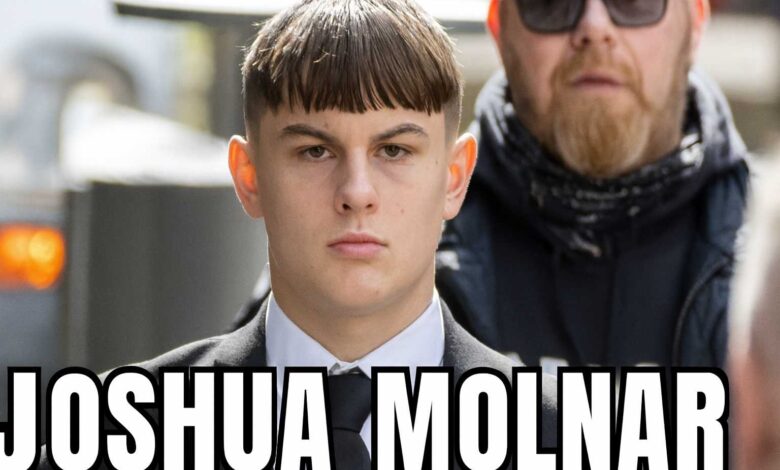Joshua Molnar: The Untold Story of Privilege, Tragedy, and Justice
A Controversial Case That Shook Britain and Redefined the Debate on Knife Crime

Introduction
The name Joshua Molnar is one that continues to stir debate in the United Kingdom. His life and involvement in the fatal stabbing of his friend, Yousef Makki, drew national attention and raised questions about class, privilege, justice, and the culture of knife crime among young people. Unlike celebrity figures who are remembered for fame, Joshua Molnar became known through a courtroom drama that combined tragedy and controversy.
The events that unfolded in March 2019 became more than just a personal tragedy; they became a national story about youth violence, accountability, and the differences between murder and manslaughter in the eyes of the law. While Molnar was acquitted of the most serious charges, his story remains central to discussions about justice and societal inequality.
Quick Bio of Joshua Molnar
| Attribute | Information |
|---|---|
| Full Name | Joshua Molnar |
| Nationality | British |
| Known For | Involvement in the fatal stabbing of Yousef Makki (2019) |
| Education | Attended private schools including Ellesmere College and Cheadle Hulme School; also studied at Wilmslow High School |
| Background | From an affluent Cheshire family |
| Legal Outcome | Acquitted of murder and manslaughter; convicted of knife possession and perverting the course of justice |
| Sentence | 16-month detention and training order |
Early Life and Education
Joshua Molnar grew up in an affluent part of Cheshire, an area often associated with privilege and opportunity. His upbringing placed him in environments that many would consider sheltered from the struggles that other communities face. This background made the tragic events of 2019 even more striking, as society expected individuals from such circumstances to be far removed from knife crime.
He attended several respected educational institutions during his teenage years. His time at private schools such as Ellesmere College and Cheadle Hulme School provided him with both academic and sporting opportunities. Later, he moved to Wilmslow High School for part of his A-level studies. These transitions highlight a varied educational path, though his school life would eventually be overshadowed by his involvement in the stabbing incident.
The Fatal Night in March 2019
On 2 March 2019, an ordinary evening in Hale Barns turned into one of the most publicized tragedies of the decade. Joshua Molnar and his friend Yousef Makki were involved in an altercation that led to Makki suffering a fatal stab wound to the chest. The sudden loss of life shocked not only their families but also the wider community.
The case was complicated by the fact that both boys came from privileged backgrounds, defying stereotypes of knife crime being confined to inner cities or deprived neighborhoods. The death of Yousef Makki showed that violence could erupt even among those who outwardly appeared to live secure, comfortable lives.
The Trial: Murder, Manslaughter, and Acquittal
In the courtroom, the central debate revolved around whether Joshua Molnar’s actions constituted murder and manslaughter or whether he had acted in self-defense. Prosecutors argued that Molnar had a fascination with knives and bore responsibility for his friend’s death. The defense, however, painted a picture of a tragic accident that occurred during a confrontation where Molnar claimed he feared for his safety.
The jury ultimately acquitted him of both murder and manslaughter. Instead, he was found guilty of carrying a knife in public and perverting the course of justice by lying to police officers about what had happened. For these offenses, Molnar received a 16-month detention and training order, serving part of that sentence before being released.
The 2023 Inquest and “Unlawful Killing”
The legal story did not end with the trial. In 2023, a fresh inquest into the death of Yousef Makki concluded with the ruling that the teenager had been unlawfully killed. This contradicted the earlier acceptance of Molnar’s self-defense claim and reignited public debate about the fairness of the outcome.
The coroner found that Makki did not have a knife in hand when he was stabbed, raising new questions about the credibility of Molnar’s account. While this inquest ruling does not overturn the original acquittal, it placed further scrutiny on the justice system and sparked renewed calls for accountability.
Public Reaction and Debate
Joshua Molnar’s case became a symbol of how class and privilege can influence public perception of crime. Many commentators pointed out that had the defendant come from a working-class or minority background, the outcome might have been different. This sparked heated debate about inequality in the justice system.
At the same time, the case became part of a broader national conversation about knife crime. Campaigners argued that the tragedy showed knife violence was not limited by geography or social background. Molnar’s story became a reminder that the issue runs deeper than stereotypes and requires urgent attention across all communities.
The Legacy of the Case
The legacy of Joshua Molnar is not one of personal achievement but of a cautionary tale. His story is forever linked to the tragic loss of Yousef Makki and the questions surrounding justice in Britain. The case highlighted the thin line between murder and manslaughter, the challenges of determining intent, and the responsibility society bears in addressing youth violence.
For Makki’s family, the fight for justice continues to be their legacy. For Molnar, his name is etched in the national memory as part of a high-profile case that revealed uncomfortable truths about class, privilege, and accountability.
Conclusion
The story of Joshua Molnar is not just about one young man; it is about the wider issues of youth violence, the justice system, and the role of privilege in shaping outcomes. His acquittal of murder and manslaughter, followed by a conviction on lesser charges, left many feeling that justice had not been fully served.
The 2023 inquest reinforced these doubts, concluding that Yousef Makki had been unlawfully killed. While Molnar remains a controversial figure, his case continues to fuel conversations about knife crime and fairness in the courts. His legacy, though tragic, serves as a powerful reminder that violence knows no boundaries and that justice must be pursued with equal determination, regardless of background.
Frequently Asked Questions (FAQ)
Q1: Who is Joshua Molnar?
Joshua Molnar is a British national who became known for his involvement in the 2019 stabbing death of his friend, Yousef Makki, in Cheshire.
Q2: Was Joshua Molnar convicted of murder?
No. He was acquitted of both murder and manslaughter but convicted of knife possession and perverting the course of justice.
Q3: What sentence did Joshua Molnar receive?
He received a 16-month detention and training order for the lesser offenses.
Q4: What did the 2023 inquest conclude?
The inquest ruled that Yousef Makki was unlawfully killed and did not have a knife when stabbed, challenging the original self-defense claim.
Q5: Why is the Joshua Molnar case significant?
It highlighted issues of knife crime, privilege, and inequality in the justice system, sparking debate across Britain.



